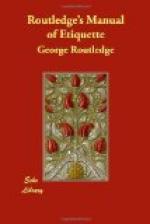A lady’s-maid that is quick and efficient is the best friend a lady can have who wishes to be well dressed and at a small expense. She saves her wages again and again. But not so with a lady’s-maid who does not understand her business. If she is always requiring assistance, and cannot make the simplest gown without a needle-woman to help her, and will not attempt a smart dress at all, or who makes it so slow that either the occasion for which it is required slips by, or a much longer notice is necessary than the most fashionable dressmaker would demand in the very height of the London season, instead of being useful, she is an incumbrance. The dressmaker’s bill is not avoided. A steady lady’s-maid who is quick at her needle and quick with her eye, can always command good wages and a good place, and they who possess such a treasure will never be willing to part with her. Any one who has not thoroughly gone into the question would not believe what a saving it is to “make at home.” It is not only that the milliner’s bill is saved, but the materials which are used do not cost so much. Nor is this all, an efficient lady’s-maid can clean and turn and re-make dresses so as to give them the look of new. To those who have but small incomes, it is of great importance not to be under the necessity of making frequent additions to their wardrobes, and anyone who can, by good management, enable them to wear a dress longer than they otherwise would, saves them, in the end, considerable outlay.
We have heard ladies say that nothing has provoked them more than the way in which their maids can make up for themselves dresses which they have laid aside. They can, by dint of sponging and washing, and pressing, and ironing by turning, and many other ways known to them, make their ladies’ cast off clothes look as good as new, and many a lady has, before now, looked with envy upon an old dress which reappears in a new character, looking quite as fresh and attractive as ever, under the magic hand of a clever and practical needle-woman.
We maintain then, that, though the present style of dress may be expensive on account of the enormous quantity of material which is required, there is no real reason why it should be so costly as it is supposed to be. If ladies will give some attention to the make or cut and style of their dresses, the most simple materials will look exceedingly effective. It only requires judgment, good taste, and some forethought and contrivance.




